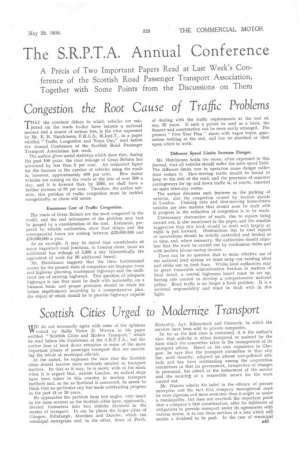The S.R.P.T.A. Annual Conference
Page 57

If you've noticed an error in this article please click here to report it so we can fix it.
Congestion the Root Cause of Traffic Problems
THAT the constant delays to which vehicles are sub jected on the roads to-day have become a national menace and a source of serious loss, is the view expressed by Mr. E. B. Hutchinson, F.R.G.S., M.Inst.T„ in a paper entitled "Traffic Congestion and Ways Out," read before the Annual Conference of the Scottish Road Passenger Transport Association last week.
The author gives useful statistics which show that, during the past 100 years, the road mileage of Great Britain has advanced by less than 5 per cent. An estimated figure for the increase in the number of vehicles using the roads is, however, approximately 800 per cent, New motor vehicles are coming on the roads at the rate of over 500 a day, and it is forecast that, by 1950, we shall have a further increase of 50 per cent. Therefore, the author submits, this problem of traffic congestion must be tackled energetically, or chaos will ensue.
Enormous Cost of Traffic Congestion.
The roads of Great Britain are the most congested in the world, and the real seriousness of the problem may best be gauged by a consideration of the cost. Estimates, prepared by reliable authorities, show that delays and the consequential losses are costing between £25,000,000 and £50,000,000 a year.
As an example, it may be stated that roundabouts at many important road junctions, in London alone, incur an additional bus mileage of 3,500 a day (theoretically the equivalent of work for 26 additional buses).
. Mr. Hutchinson suggests that the three fundamental causes for the present state of congestion are improper town and highway planning, inadequate highways and the inefficient use of existing highways. This question of adequate highways is one that must be dealt with nationally, on a business basis, and proper provision should be made for future requirements according to a comprehensive plan, the object of which should be to provide highways capable of dealing with the traffic requirements at the , end of, say, 25 years. If such a period be used as a basis, the finance and construction can be more easily arranged. The present "Five Year Plan" starts with vague hopes, guarantees nothing at the end, and has no standard or ideal upon which to work.
Different Speed Limits Increase Danger.
• Mr. Hutchinson holds the views, often expressed in this journal, that all vehicles should suffer the same speed limit. The different limits now in operation cause danger rather than reduce it. Slow-moving traffic should he forced to keep to the side of the road, and the provision of separate carriageways for up and down traffic is, of course, essential on main inter-city routes.
The author discusses such features as the parking of vehicles, also the congestion caused by taxicab stands in London. Cruising cabs and slow-moving horse-drawn vehicles are also matters that should soon be dealt with if progress in the reduction of congestion is to be made.
Unnecessary obstruction of roads, due to repairs being carried out, is also mentioned in the paper, and the sensible suggestion that this work should be dealt with largely at night is put forward. Obstructions due to road repairs or excavations should be strictly controlled and limited as to time, and, where necessary, the authorities should stipulate that the work he carried out by continuous shifts and with modern labour-saving devices.
There can be no question that to make effective use of our national road system we must scrap our existing ideas and strike out on fresh lines. Whilst local authorities may be given reasonable administrative freedom in matters of local detail, a central highways board must be set up, having sole control to develop a comprehensive national policy. Road traffic is no longer a local problem. It is a national responsibility and must be dealt with in this light.




























































































